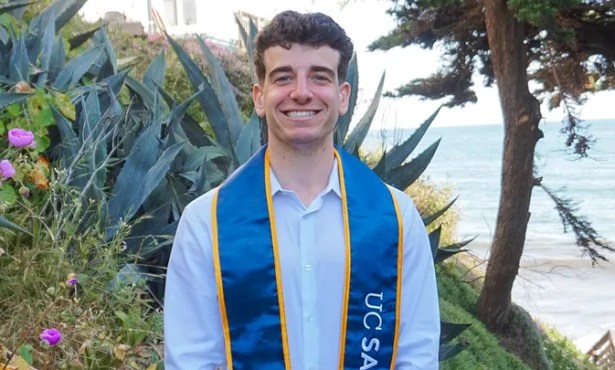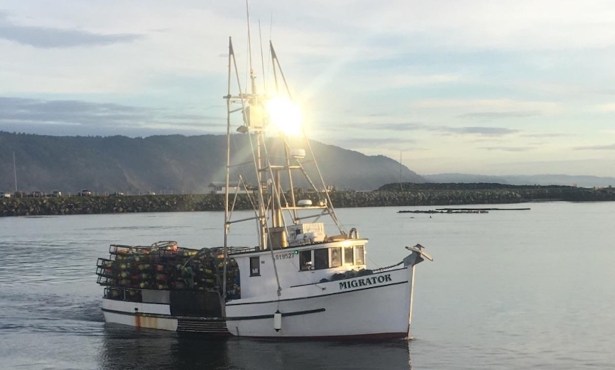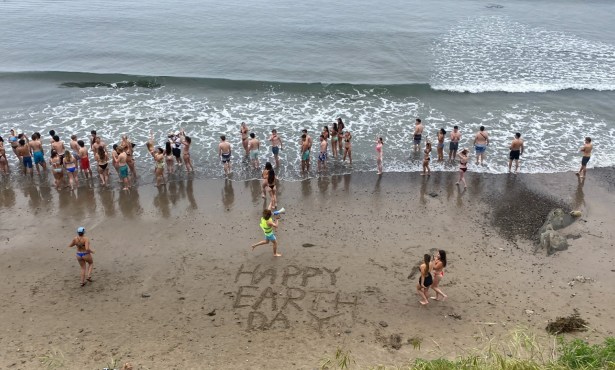Vandenberg Protesters Convicted of Federal Charges
Five Members of Catholic Worker Tried for Trespassing; Four Convicted; Sentencing in February
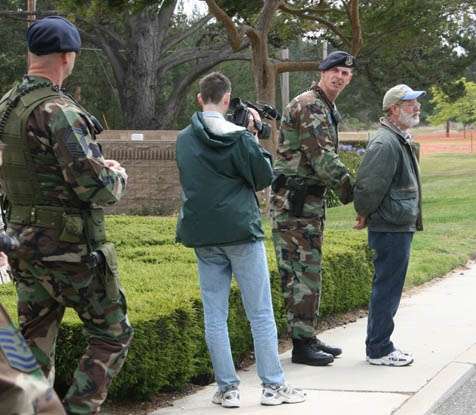
As the 30th Space Wing prepared for the Friday morning test launch of a Missile Defense Agency ground-based interceptor at Vandenberg Air Force Base, protesters from the Catholic Worker were tried in federal court for trespassing on the base in 2007. Members of the social justice activism group meet at the gates of the base on the first Tuesday of every month and during intercontinental ballistic missile test launches; their largest gatherings occur twice per year and coincide with Keep Space for Peace Day in October and Armed Forces Day in May. It was during their May 2007 vigil at Vandenberg’s main gate that five members of Catholic Worker – Dennis Apel, Jeff Dietrich, Father Louis Vitale, Father Steve Kelly, and Mike Wisniewski – were arrested after crossing a green line painted on the sidewalk by the Air Force to mark the beginning of its jurisdiction. All but Wisniewski – who was photographing the protest for Catholic Worker’s publication, The Catholic Agitator – were convicted.
Federal public defender John Littrell motioned to have the case against Wisniewski dropped because he was functioning as a professional photographer that day. Wisniewski believed that, because he was credentialed by the Agitator and followed the pack of other photographers back and forth across the green line, he should not have been charged with trespassing. Wisniewski said he was singled out for wearing a Catholic Worker “No War” T-shirt, but he had also failed to request media credentials from the base. Why? “I don’t cooperate with the system,” he said. Due to his participation in prior protests and lingering questions about his true role in the May 2007 event, Judge Rita Coyne Federman ruled that he was to be tried with the others.
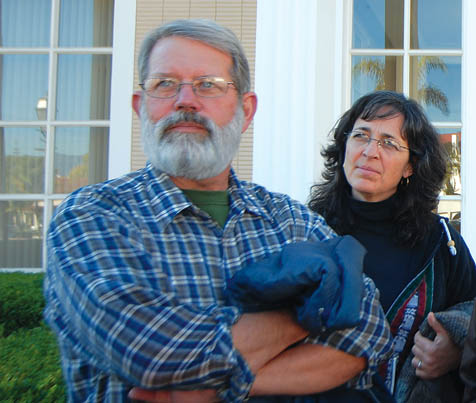
During the trial, Littrell and his co-counsel Kate Chatfield – a friend of the defendants who took the case pro bono – argued that the green line is arbitrarily enforced by Vandenberg security forces. They presented testimony from several of the defendants who said that military officials ignored the group of pro-military protesters and were instead jeering at those participating in the Catholic Worker vigil. Benjamin Ahrens, a City of Santa Barbara police officer who was a sergeant on Vandenberg’s security force when the incident occurred, was cross-examined by the defense council and prosecutor Sharon McCaslin as to his role in the affair, and indicated that his team only addressed people who had actually crossed the green line.
Apel – a vocal opponent of the Iraq War and the military’s use of nuclear weapons who once served time in prison for spraying his own blood on the Vandenberg gates – delivered tearful testimony from the stand, saying that his group’s goal had been to engage the base’s airmen and request that they leave the military to become peacemakers. “I did not want to get arrested,” said Apel, responding to the prosecution’s assertion that getting arrested was their goal, “but I was willing to risk that because of the stakes of people dying.”
Father Steve Kelly spoke as part of the defense team’s closing argument. “Dennis couldn’t say what he needed to say on the other side of the green line,” said Kelly. “I believe that this is a selective prosecution. Apel and Vitale have real concern for victims of the war and the airmen they were trying to speak to.”
Having been an Air Force navigation officer aboard national air defense pursuit aircraft in the early 1950s, Vitale said that he wished to impart the benefit of his experience upon today’s airmen. “I wish someone had talked to me that way when I was in the Air Force. I would have looked at things differently,” he said, recalling an incident where he was ordered to shoot down an alleged enemy bomber only to find out that it was a passenger aircraft. (He did not execute the order, perhaps his first act of civil disobedience.)
McCaslin, the prosecutor, countered the actions of the five men were a clear and simple violation of federal law and cited as evidence the three videos that show the men being arrested after being asked repeatedly to move to the other side of the green line. (Those videos don’t show much of Wisniewski, but he could be seen crossing the line to take photos.) She also asked Ahrens his recollection. “I could hear [Apel] fine from the highway side of the line,” said the security guard.
The green line, painted on the sidewalk in front of the main gate of the base to demark Air Force jurisdiction from combined Air Force and Santa Barbara County jurisdiction, has become the focal point of many of the protests over the past few years. The peculiar procedure surrounding protests at the base have come to include draping the stone entrance signs on either side of the base’s main gate with black cloth, surrounding them with orange construction fencing, and staffing the area with a throng of security personnel. During larger protests, Vandenberg’s public affairs office provides portable toilets and parking for the protesters. The only catch is that they’re not allowed to cross the green line once the protest begins.
Several of the men charged with trespassing at the base last May have been arrested on prior occasions during similar protests. Apel’s blood-throwing incident – which occurred five days before the start of the Iraq War in 2003 and was done to symbolize the blood about to be spilled – led to two months in prison for defacing government property. Kelly and Vitale were both imprisoned for five months following a 2007 protest at Fort Huachuca, Arizona, home to the military’s training program for intelligence personnel. The two were trying to hand-deliver a letter to the fort’s authorities that linked their training to the interrogations using torture conducted at places such as Abu Ghraib, and they refused to leave when asked.
A year and a half might seem an unreasonable amount of time for a trespassing case to be heard in court, but the imprisonment of the two priests, along with Ahrens’s obligation to complete the City of Santa Barbara’s police academy, had made it impossible for all of the involved parties to appear in court. At the conclusion of Thursday’s trial, Kelly requested that Federman pronounce their sentences on the spot, but the judge wanted a full report on the defendants’ prior records and financial status before making determining their sentences.
That hearing will be held on March 12 at 1:30 p.m. at the federal bankruptcy court in Santa Barbara. McCaslin said that the four were convicted of class B misdemeanors, which carry a maximum sentence of six months in jail, a $5,000 fine, and up to five years of probation.

